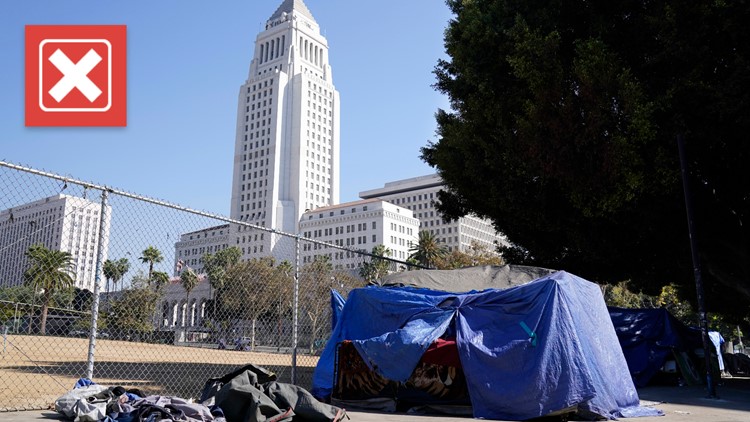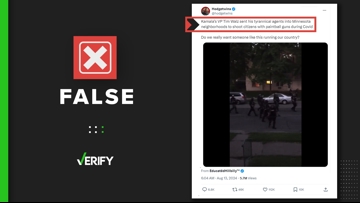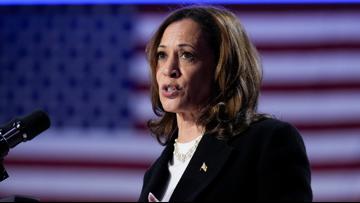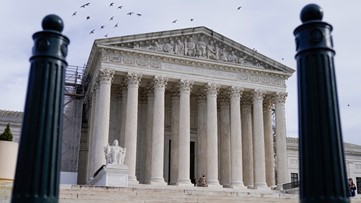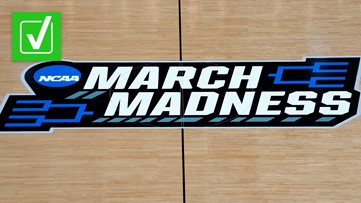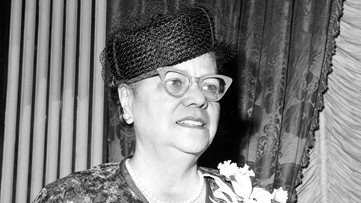In the last decade, a number of nonprofit organizations, policy institutes and media organizations have cited the U.S. Department of Housing and Urban Development to claim that the cost to end homelessness in the United States would be $20 billion.
And it’s not just organizations, either. Social media users often share that $20 billion figure and compare it to other federal government expenditures. One such post from April said, “the US military just spent more on these stupid augmented reality headsets from Microsoft than it would cost to completely eradicate homelessness ($20 billion).”
THE QUESTION
Does it cost $20 billion to end homelessness?
THE SOURCES
- Mark Johnston, formerly acting assistant housing secretary for community planning and development at the Department of Housing and Urban Development
- Dennis Culhane, researcher on homelessness for 35 years and professor at University of Pennsylvania
- Culhane’s 2021 study on estimated revenue of American homeless shelters
- Congressional Budget Office
- HUD housing choice vouchers fact sheet
- Nan Roman, president & CEO of the National Alliance to End Homelessness
THE ANSWER
No. That number came from an unofficial estimate made in 2012 that’s now outdated.
Homelessness is a problem created in large part due to issues with a variety of systems, which makes finding a solution to ending it and calculating the cost for that solution complicated. A recent study suggested it would cost $30 billion a year just to expand the federal housing voucher program to every person who is eligible for it, which is one solution that advocates say would significantly reduce homelessness but not end it entirely.
WHAT WE FOUND
According to the 2020 Department for Housing and Urban Development (HUD) point-in-time count, which counts the number of homeless people on a single night across the nation, there are more than 580,000 homeless people on any given night in the United States. The count is not a sum of the total people who experience homelessness throughout the year and homeless advocacy organizations believe it to be an undercount even for that single night.
The $20 billion figure for the cost to end homelessness appears to originate from media reports from 2012 paraphrasing an estimate attributed to Mark Johnston, then in HUD. The New York Times said Johnston “estimated that homelessness could be effectively eradicated” with $20 billion annually.
But that statement was never directly quoted and that figure was never included in any HUD documents or press releases that VERIFY could find from that time or since.
Mark Johnston is no longer with HUD but still works in fighting homelessness with a position on Salt Lake County’s public housing authority. He gave VERIFY some background on that $20 billion figure attributed to him in an email.
“I vaguely remember doing a quick estimate---nothing in depth--of what it would have taken to end homelessness back in probably 2012 or 2013. I don't remember if it was $20 billion or something else. It wasn't formal, wasn't verified, wasn't approved by HUD. And it's certainly very much out of date now, 10 years later,” he said.
So it’s certainly not accurate to say HUD says the cost of ending homelessness would be $20 billion annually. In fact, there’s no singular, widely accepted “cost to end homelessness” that’s been calculated, and that’s for good reason.
“It’s not so difficult to figure out what it would cost to end homelessness for everyone who is homeless tonight. That can be estimated based on past experience of serving people experiencing homelessness (although given the multitude of funding sources, public and private, that can be less than precise),” said Nan Roman, president & CEO of the National Alliance to End Homelessness, in a written statement. “The problem is that more people BECOME homeless every day because they don’t earn enough to pay for housing – we’re 7 million housing units short to meet the needs of low-income people. So, the best way to estimate the cost of ending homelessness might be to figure out what it would cost to ensure that everyone in our nation has a basic home, food, and health care. That cost might even be less expensive than all the emergency services that are amassed because we let people become homeless. Giving a housing voucher to everyone eligible would be a good start.”
Researchers Dennis Culhane and Seongho An studied the revenues of homeless shelters and used that data to extrapolate nationwide costs for the shelter system and expanding that system in a study published May 11. Based on their findings, they agreed with Roman: the most efficient and comprehensive way to tackle homelessness would be to expand federal housing vouchers to all eligible renters — which a pair of researchers they referenced recently estimated would cost $30 billion annually.
A Congressional Budget Office report from 2015 estimated the cost of expanding the federal housing voucher program to be between $29 billion and $41 billion over the next 10 years. The Center on Budget and Policy Priorities estimates just over 10 million benefit from housing vouchers currently, which they say is only 40% of the people who need them.
HUD describes the federal housing vouching program to be “the federal government's major program for assisting very low-income families, the elderly, and the disabled to afford decent, safe, and sanitary housing in the private market.” The renter or family contributes 30% of their monthly income in rent, and the federal government covers the remainder of the cost. The number of vouchers that can be granted annually is currently capped.
In an interview with VERIFY, Culhane explained that the shelter program is largely run by nonprofit organizations and funded by private philanthropy. He said expanding the voucher program “would be more effective, more efficient and more humane” than the current system.
However, Culhane recognized that expanding the federal housing voucher program would still need to include a smaller emergency shelter system for unavoidable or sudden losses of housing, such as in cases of sudden but temporary financial hardship or in cases where minors are kicked out of or run away from their homes.
Culhane also explained that other government policy changes would have to be included in the solution.
“Mental health services need to be more available. Substance abuse and treatment services need to be made more available, and the basic income supports need to be functional,” he said. “You know, the fact that most of the homeless are either disabled or elderly means that our social insurance programs for the disabled and elderly aren't working. So, we should be fixing those.” He also identified gaps in health care affordability, housing affordability, and income safety nets as part of the issue.
So while there is no complete estimate of how much it would take to completely eradicate homelessness, it would definitely cost more than just $20 billion. And the solution probably wouldn’t be just an issue of providing housing. There would likely be additional costs in fixing the systems that contribute to homelessness, as well.
VERIFY
Our journalists work to separate fact from fiction so that you can understand what is true and false online. Please consider subscribing to our daily newsletter, text alerts and our YouTube channel. You can also follow us on Snapchat, Twitter, Instagram or Facebook.

